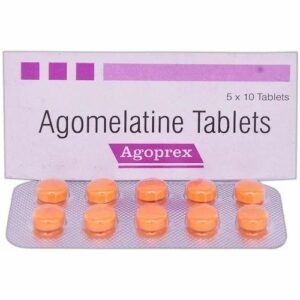AGOMELATINE
AGOMELATINE: Agomelatine is a medication that is primarily used to treat major depressive disorder (MDD) in adults. It is classified as a “melatonergic agonist and selective antagonist of the 5-HT2C receptor” and is available under the brand name Valdoxan.
The exact mechanism of action of agomelatine is not fully understood, but it is believed to work by acting as an agonist at melatonin receptors (MT1 and MT2) and as an antagonist at serotonin (5-HT2C) receptors. This helps to regulate circadian rhythms and restore the balance of chemicals in the brain associated with mood regulation.
The recommended starting dose of agomelatine is usually 25 mg taken orally, once daily at bedtime. Depending on the individual response and tolerability, the dose can be increased to a maximum of 50 mg per day.
Common side effects of agomelatine may include:
1. Nausea
2. Headache
3. Dizziness
4. Fatigue
5. Sleep disturbances (such as insomnia or excessive sleepiness)
6. Gastrointestinal disturbances (such as diarrhea or constipation)
7. Abdominal pain
8. Back pain
9. Vomiting
10. Increased liver enzymes
It’s worth noting that agomelatine may cause liver-related adverse effects in rare cases. Therefore, regular monitoring of liver function is required during treatment.
As with any medication, it is important to discuss any potential risks and benefits with a healthcare professional, as they can provide personalized guidance based on an individual’s specific medical history and circumstances.

